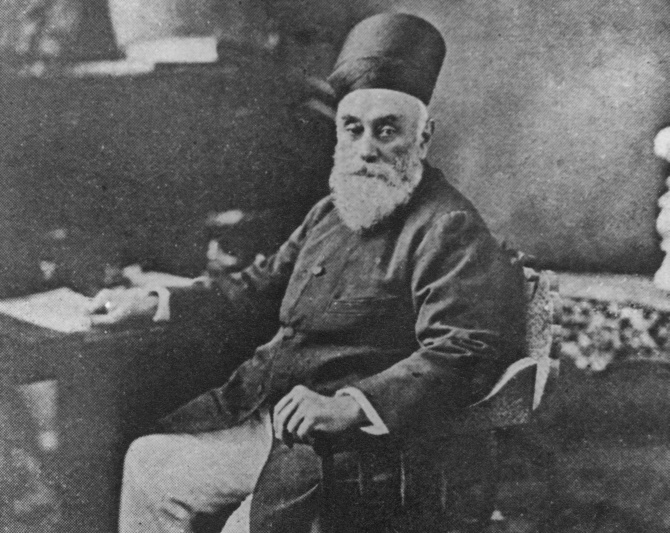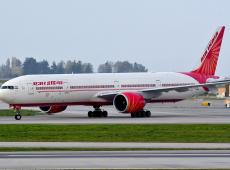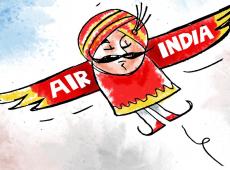Jamsetji Tata: The Untold Story of Tata Group's First Business
By Rediff Money Desk, New Delhi Aug 04, 2024 11:30
Discover the story of Jamsetji Tata's first business venture, Tata Line, and his bold decision to shut it down despite its potential impact on his reputation. Learn about his fight against the monopoly of P.&O., the shipping line that dominated India's exports in the 19th century.

Photograph: Henry Guttmann/Hulton Archive/Getty Images
New Delhi, Aug 4 (PTI) Known for the successful ventures he established, Jamsetji Tata, founder of the Tata Group, did not shy away from taking tough calls and making strategic choices to exit from unviable business as shown by the shutting of Tata Shipping Line in the 1890s, according to a new book.
He had started the 'Tata Line', the first ever business of the Tata Group which bore the Tata name, with a view to challenge the monopoly of the English P.&O., the pre-eminent shipping line that carried exports from India during the 1880s and 1890s.
The English P.&O. which had the support of the then British India government, had a virtual monopoly on shipping from India and charged Indian merchants exorbitant freight rates, while providing greater rebates on British and Jewish firms thereby creating an uneven playing field for Indians, according to the book titled 'Jamsetji Tata - Powerful Learnings For Corporate Success'.
"Jamsetji Tata, who was in the textile business at that time, was adversely impacted, and he felt that this was very unfair to Indians," wrote the authors, R Gopalakrishnan and Harish Bhat, two Tata group veterans, in their recently released book published by Penguin Random House India.
The pioneer of modern Indian industry then travelled to Japan to strike a collaboration with Nippon Yusen Kaisha (NYK), the largest shipping line of that country, which agreed to partner provided Jamsetji took "an equal risk in the venture and ran the ships on his own".
Afterwards, he chartered an English ship 'Annie Barrow' at a fixed rate of 1,050 pounds per month and made it the first vessel of the new shipping company, which he called the 'Tata Line' -- this was the first ever business of the Tata Group which bore the Tata name.
Jamsetji felt that this venture would benefit not only his textile business but also the entire Indian textile industry through lower shipping rates of Rs 12 per tonne of freight as compared to Rs 19 per tonne charged by P.&O and break the latter's monopoly.
A second ship 'Lindisfarne' was also chartered soon afterwards.
The Tribune newspaper in October 1894 wrote that Jamsetji's effort had "been the subject of general praise in the industrial centre of India".
P.&O. reacted immediately "announcing that it would reduce rates dramatically Rs 1.8 per ton. However, merchants could obtain this rate if they signed an agreement with P.&0. that they would not use the Tata Line or ships belonging to NYK".
The English shipping line had also offered some specific merchants to carry their cotton to Japan free of charge, while starting to disparage Tata Line spreading word that one of its ships 'Lindisfarne' was unfit to carry cotton.
Jamsetji took up with the British Indian government against the unfair practices of P.&O. in vain.
Gradually, Indian merchants withdrew from their contracts with Tata Line despite Jamsetji's warning that if his shipping company closed, P.&O. would raise rates steeply one again.
The 'War of Freights' between Tata Line and P.&O. spread even to newspapers when anonymous letters were published in local newspapers questioning Jamsetji's "patriotic motives in starting the Tata Line'.
He had already spent over Rs 1 lakh on Tata Line and each month the business was "costing him losses running up to tens of thousands of rupees" which were very large amounts in the 1980s.
Jamsetji was deeply distressed but thought through the situation deeply.
"At the end of this strategic reflection, he appears to have reached the conclusion that there was no sustainable or feasible way forward for Tata Line," according to the book.
He then decided, quite clinically, to shut down this business, notwithstanding the risks this closure could pose for his reputation as a very successful entrepreneur.
"He sent back to England the ships he had leased, and the Tata Line was, sadly, shut down."
Most of Jamsetji Tata's ventures -- Empress Mills, Svadeshi Mills, Ahmedabad Advance Mills, Tata Steel and Tata Power -- succeeded. The Tata Line is the one that did not.
"The story of this venture, Jamsetji's initial vision as well as his decision to exit from it when he saw no ray of hope, as the industry was dominated by an unfair monopoly strongly supported by the then government, tells us that he did not shy away from making the right strategic choices untainted by emotions," wrote the authors.
He had started the 'Tata Line', the first ever business of the Tata Group which bore the Tata name, with a view to challenge the monopoly of the English P.&O., the pre-eminent shipping line that carried exports from India during the 1880s and 1890s.
The English P.&O. which had the support of the then British India government, had a virtual monopoly on shipping from India and charged Indian merchants exorbitant freight rates, while providing greater rebates on British and Jewish firms thereby creating an uneven playing field for Indians, according to the book titled 'Jamsetji Tata - Powerful Learnings For Corporate Success'.
"Jamsetji Tata, who was in the textile business at that time, was adversely impacted, and he felt that this was very unfair to Indians," wrote the authors, R Gopalakrishnan and Harish Bhat, two Tata group veterans, in their recently released book published by Penguin Random House India.
The pioneer of modern Indian industry then travelled to Japan to strike a collaboration with Nippon Yusen Kaisha (NYK), the largest shipping line of that country, which agreed to partner provided Jamsetji took "an equal risk in the venture and ran the ships on his own".
Afterwards, he chartered an English ship 'Annie Barrow' at a fixed rate of 1,050 pounds per month and made it the first vessel of the new shipping company, which he called the 'Tata Line' -- this was the first ever business of the Tata Group which bore the Tata name.
Jamsetji felt that this venture would benefit not only his textile business but also the entire Indian textile industry through lower shipping rates of Rs 12 per tonne of freight as compared to Rs 19 per tonne charged by P.&O and break the latter's monopoly.
A second ship 'Lindisfarne' was also chartered soon afterwards.
The Tribune newspaper in October 1894 wrote that Jamsetji's effort had "been the subject of general praise in the industrial centre of India".
P.&O. reacted immediately "announcing that it would reduce rates dramatically Rs 1.8 per ton. However, merchants could obtain this rate if they signed an agreement with P.&0. that they would not use the Tata Line or ships belonging to NYK".
The English shipping line had also offered some specific merchants to carry their cotton to Japan free of charge, while starting to disparage Tata Line spreading word that one of its ships 'Lindisfarne' was unfit to carry cotton.
Jamsetji took up with the British Indian government against the unfair practices of P.&O. in vain.
Gradually, Indian merchants withdrew from their contracts with Tata Line despite Jamsetji's warning that if his shipping company closed, P.&O. would raise rates steeply one again.
The 'War of Freights' between Tata Line and P.&O. spread even to newspapers when anonymous letters were published in local newspapers questioning Jamsetji's "patriotic motives in starting the Tata Line'.
He had already spent over Rs 1 lakh on Tata Line and each month the business was "costing him losses running up to tens of thousands of rupees" which were very large amounts in the 1980s.
Jamsetji was deeply distressed but thought through the situation deeply.
"At the end of this strategic reflection, he appears to have reached the conclusion that there was no sustainable or feasible way forward for Tata Line," according to the book.
He then decided, quite clinically, to shut down this business, notwithstanding the risks this closure could pose for his reputation as a very successful entrepreneur.
"He sent back to England the ships he had leased, and the Tata Line was, sadly, shut down."
Most of Jamsetji Tata's ventures -- Empress Mills, Svadeshi Mills, Ahmedabad Advance Mills, Tata Steel and Tata Power -- succeeded. The Tata Line is the one that did not.
"The story of this venture, Jamsetji's initial vision as well as his decision to exit from it when he saw no ray of hope, as the industry was dominated by an unfair monopoly strongly supported by the then government, tells us that he did not shy away from making the right strategic choices untainted by emotions," wrote the authors.
Source: PTI
Read More On:
DISCLAIMER - This article is from a syndicated feed. The original source is responsible for accuracy, views & content ownership. Views expressed may not reflect those of rediff.com India Limited.
You May Like To Read
TODAY'S MOST TRADED COMPANIES
- Company Name
- Price
- Volume
- GTL Infrastructure
- 2.89 (+ 4.71)
- 121757816
- G V Films
- 0.91 (+ 2.25)
- 76902965
- Srestha Finvest
- 2.26 (+ 4.63)
- 55617757
- Vodafone Idea L
- 16.11 (+ 0.75)
- 46855004
- Suzlon Energy Ltd.
- 71.44 (+ 4.98)
- 30765378
MORE NEWS

Telangana IT Exports Surge 11% to Rs 2.68 Lakh...
Telangana's IT sector witnessed robust growth in FY24, with exports reaching Rs 2.68...

Trai's Stricter Telecom QoS Norms: COAI...
Telecom regulator Trai's new quality of service norms with stricter provisions have...

BCCL Pays First Dividend: Rs 44 Cr to CIL
Bharat Coking Coal Limited (BCCL) paid its inaugural dividend of Rs 44.43 crore to Coal...












 © 2024 Rediff.com India Limited. All rights reserved.
© 2024 Rediff.com India Limited. All rights reserved.